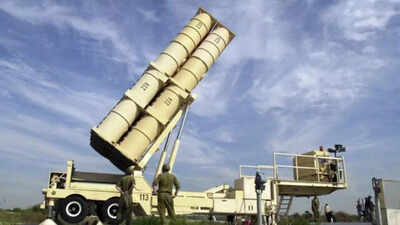
Israel's Arrow anti-missile defence system
Israel may be running dangerously low on its stock of Arrow missile interceptors, according to a report by the Wall Street Journal that cites a senior US official. The warning comes as Israel faces an unprecedented volume of ballistic missile attacks from Iran in the sixth day of full-blown conflict between the two countries.The Israel Defence Forces (IDF) has not confirmed any shortage and maintains that its air defence systems are successfully intercepting most incoming missiles. “The IDF is prepared and ready to handle any scenario. Unfortunately, we are unable to comment on matters related to munitions,” the military said in a statement.However, the American report suggests that the US has been aware of the problem for months and has quietly bolstered Israel’s defences with additional ground, sea, and air-based systems.
The Pentagon has deployed assets including the Patriot and THAAD missile defence systems, while US Navy destroyers are assisting in intercept operations.Israel’s own Arrow system, developed by Israel Aerospace Industries, plays a critical role in intercepting long-range ballistic missiles. But with Iran firing hundreds of missiles in recent days, including the advanced Fatah-1 which Tehran says can escape current defence systems, pressure on Israel’s Arrow missile stock is growing.
Iran’s Revolutionary Guards claim these missiles move at hypersonic speeds, making them harder to stop.Tom Karako, director of the Missile Defense Project at the Center for Strategic and International Studies, said that US and Israel cannot intercept missiles forever.“Neither the US nor the Israelis can continue to sit and intercept missiles all day. The Israelis and their friends need to move with all deliberate haste to do whatever needs to be done, because we cannot afford to sit and play catch," Karako said.Meanwhile, Israel has launched a new wave of attacks on Tehran in broad daylight, using over 50 fighter jets. The IDF said these strikes targeted a centrifuge production facility in Tehran used to enhance uranium enrichment and multiple other military production sites.In response, alerts for hostile aircraft were triggered multiple times on Wednesday morning in the Golan Heights. The IDF reported intercepting seven drones launched from Iran, preventing them from reaching Israeli territory.The escalating crisis has also affected civil aviation. Israeli airline El Al landed its first “Safe Return” evacuation flight from Cyprus at Ben Gurion Airport on Wednesday morning, amid tightened security protocols.Adding fuel to the fire, Iran’s Supreme Leader Ayatollah Ali Khamenei posted on social media: “Force must be used against the Zionist terrorist entity. We will not show leniency toward the Zionists.”US President Donald Trump has said it would be "easy" for the superpower to locate and eliminate Iran’s leader. US involvement in the conflict is possible but has not been officially confirmed by the Pentagon.

 3 weeks ago
12
3 weeks ago
12










 English (US) ·
English (US) ·